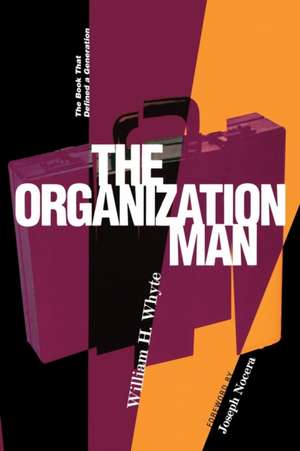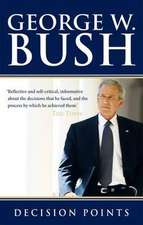The Organization Man
Autor William H. Whyte, Joseph Noceraen Limba Engleză Paperback – 26 iun 2002
Preț: 284.75 lei
Nou
54.49€ • 56.68$ • 44.99£
Carte disponibilă
Livrare economică 24 martie-07 aprilie
Livrare express 07-13 martie pentru 45.11 lei
Specificații
ISBN-10: 0812218191
Pagini: 448
Dimensiuni: 164 x 226 x 26 mm
Greutate: 0.68 kg
Ediția:Revised
Editura: MT – University of Pennsylvania Press
Locul publicării:United States
Notă biografică
William H. Whyte (1917-1999) was editor of Fortune magazine and Distinguished Professor at Hunter College of the City University of New York. He is the author of numerous books of social and environmental analysis, including The Last Landscape, also available from the University of Pennsylvania Press. Joseph Nocera, Fortune magazine executive editor, is an award-winning financial journalist. He is the author of A Piece of the Action: How the Middle Class Joined the Money Class, which won the New York Public Library's Helen Bernstein Award for Excellence in Journalism, and he anchored the 1997 PBS Frontline documentary "Betting on the Market." Jenny Bell Whyte, a fashion designer, is credited with introducing African textiles to the mainstream American clothing market. Her current company, Museum Pieces to Wear, restores old textiles and incorporates them into new clothes. She and William H. Whyte were married in 1964.
Recenzii
Descriere
Regarded as one of the most important sociological and business commentaries of modern times, The Organization Man developed the first thorough description of the impact of mass organization on American society. During the height of the Eisenhower administration, corporations appeared to provide a blissful answer to postwar life with the marketing of new technologies—television, affordable cars, space travel, fast food—and lifestyles, such as carefully planned suburban communities centered around the nuclear family. William H. Whyte found this phenomenon alarming.
As an editor for Fortune magazine, Whyte was well placed to observe corporate America; it became clear to him that the American belief in the perfectibility of society was shifting from one of individual initiative to one that could be achieved at the expense of the individual. With its clear analysis of contemporary working and living arrangements, The Organization Man rapidly achieved bestseller status.
Since the time of the book's original publication, the American workplace has undergone massive changes. In the 1990s, the rule of large corporations seemed less relevant as small entrepreneurs made fortunes from new technologies, in the process bucking old corporate trends. In fact this "new economy" appeared to have doomed Whyte's original analysis as an artifact from a bygone day. But the recent collapse of so many startup businesses, gigantic mergers of international conglomerates, and the reality of economic globalization make The Organization Man all the more essential as background for understanding today's global market. This edition contains a new foreword by noted journalist and author Joseph Nocera. In an afterword Jenny Bell Whyte describes how The Organization Man was written.
Cuprins
Foreword, by Joseph Nocera PART I. THE IDEOLOGY OF ORGANIZATION MAN 1. Introduction 2. Decline of the Protestant Ethic 3. Scientism 4. Belongingness 5. Togetherness PART II. THE TRAINING OF ORGANIZATION MAN 6. A generation of Bureaucrats 7. The Practical Curriculum 8. Business Influence on Education 9. The Pipe Line 10. The "Well-Rounded" Man PART III. THE NEUROSES OF ORGANIZATION MAN 11. The Executive: Non-Well-Rounded Man 12. 12. The Executive Ego 13. Checkers PART IV. THE TESTING OF ORGANIZATION MAN 14. How Goon an Organization Man Are You? 15. The Tests of Conformity PART V. THE ORGANIZATION SCIENTIST 16. The Fight against Genius 17. The Bureaucratization of the Scientist 18. The Foundations and Projectism PART VI. THE ORGANIZATION MAN IN FICTION 19 Love That System 20. Society As Hero PART VII. THE NEW SUBURBIA: ORGANIZATION MAN AT HOME 21. The Transients 22. The New Roots 23. Classlessness in Suburbia 24. Inconspicuous Consumption 25. The Web of Friendship 26. The Outgoing Life 27. The Church of Suburbia 28. The Organization of Children 29. Conclusion Afterword, by Jenny Bell Whyte Appendix: How to Cheat on Personality Tests Acknowledgments Index


















